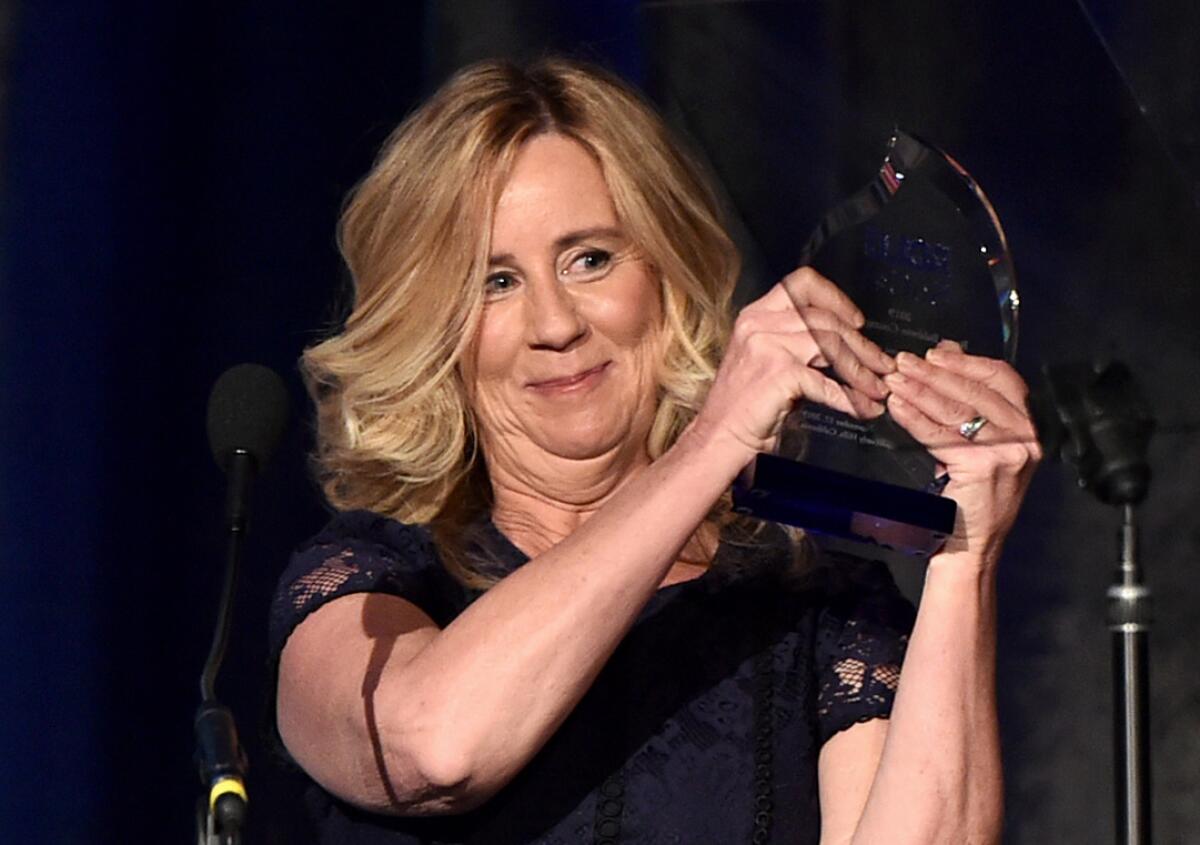Christine Blasey Ford’s courage was in the spotlight again. So were Brett Kavanaugh’s tears

- Share via
They were at the center of an ugly national political storm last year that will reverberate for decades. Afterwards, both went into hiding — one literally, the other figuratively.
And now, in the span of three days, both have reclaimed the spotlight.
On Thursday, Supreme Court Justice Brett M. Kavanaugh received a standing ovation at the annual gala for the Federalist Society, the legal group that has made it a mission to pack the court with conservative jurists.
It was Kavanaugh’s first major public appearance since he was confirmed by a razor-thin Senate margin in October 2018, then sworn in during a private ceremony. He has kept a low profile in the past year.
Attendees at the Federalist Society’s Washington, D.C., bash were greeted outside by protesters. And inside the hall, the dinner was disrupted by protesters blaring rape whistles, until they were escorted out of the hall. The crowd gave him a hero’s welcome.
By contrast, there were no protesters Sunday evening in Beverly Hills, when Christine Blasey Ford accepted a richly deserved courage award from the American Civil Liberties Union of Southern California. Blasey Ford is the Palo Alto University research psychologist who told the Senate Judiciary Committee — and the nation — that Kavanaugh had sexually assaulted her when she was a teenager. It was Blasey Ford’s first major appearance since she was driven into hiding by death threats. The ACLU did not publicize her appearance; she is still wary of personal danger.
“When I came forward last September,” Blasey Ford said, “I did not feel courageous. I was simply doing my duty as a citizen, providing information to the Senate that I believed would be relevant to the Supreme Court nomination process. I thought anyone in my position, of course, would do the same thing.”
Of course. That’s what you would think. Sadly, it was not to be. No matter how far we have come, this country is steeped in male privilege. Combine that with rank partisanship and you get the toxic brew we saw during the Kavanaugh hearings, and that we saw again last week in the impeachment inquiry, when President Trump savaged Ambassador Marie Yovanovitch on Twitter in the middle of her testimony. She had the temerity to tell lawmakers she was the victim of a smear by Trump’s political henchmen.
::
In 1991, Anita Hill was verbally brutalized by Republican senators when she stepped forward to accuse then-Supreme Court nominee Clarence Thomas of sexual harassment. So Blasey Ford knew that her accusations would not be welcomed, or believed, by Kavanaugh supporters.
But it did seem possible, all these years later, and in the aftermath of the #MeToo scandal, that lawmakers would be more sensitive to a woman describing an assault. Senators pretended to be; they didn’t attack Blasey Ford so much as get hysterical about the process, sort of like Republicans are doing now over the impeachment inquiry.
“I was not prepared for the venom, the persistent attacks, the vilification, the loss of personal privacy and the collateral damage to my friends and family,” Blasey Ford said. “I was not prepared to be physically threatened or to be forced out of our home for over three months.”
She thanked her friends, her family and the 200,000 people from around the world who sent messages of support, many of whom shared their own stories of assault and abuse.
Strangely — or maybe not so strangely — Kavanaugh’s speech struck similar notes.
“I signed up for what I knew would be an ugly process,” he told the Federalist Society, at one point breaking into tears. “Maybe not that ugly. People risked their jobs, their livelihoods. Some of them lost business. They were yelled at, insulted, threatened. Many of my friends lost other friends merely because they supported me. My friends paid a heavy price, way too heavy a price.”
I’m sure the process was hard on him.
But in my view, Kavanaugh was never the victim here.
Who can forget the difference in their comportment during the tumultuous Senate hearings?
Blasey Ford calmly and, to my mind, credibly recounted being shoved into a room and held down on a bed by a drunken Kavanaugh when she was 15 and he was 17. It seemed abundantly clear to me and many others who heard her that she was not making up a story, or mixing up her assailant with someone else. How could she forget or bumble the identity of someone she feared was going to suffocate her after he pushed her down and held his hand over her mouth?
Kavanaugh, by contrast, was petulant, partisan, insulting and self-pitying. He bizarrely accused his critics of seeking revenge “on behalf of the Clintons.” His responses to Democratic senators who asked about his drinking were memorably inappropriate: “I like beer. I don’t know if you do…. Do you like beer, Senator, or not? What do you like to drink? Senator, what do you like to drink?”
I wrote then that such an intemperate display was unworthy of a person being considered for a lifetime appointment on the nation’s highest court. He should have been disqualified on the spot.
Instead, he was embraced by Republicans, who have shown, time and again, that ideology comes before ethics, and that women who come forward to accuse powerful men of bad conduct are not to be believed.
We are stuck with Kavanaugh on the high court. He won.
But it’s important that truth tellers like Blasey Ford not disappear from view. Hill has not shied away from the spotlight, nor should she. Both showed a rare courage: the willingness to do the right thing for the sake of her country, the high price be damned.
More to Read
A cure for the common opinion
Get thought-provoking perspectives with our weekly newsletter.
You may occasionally receive promotional content from the Los Angeles Times.







